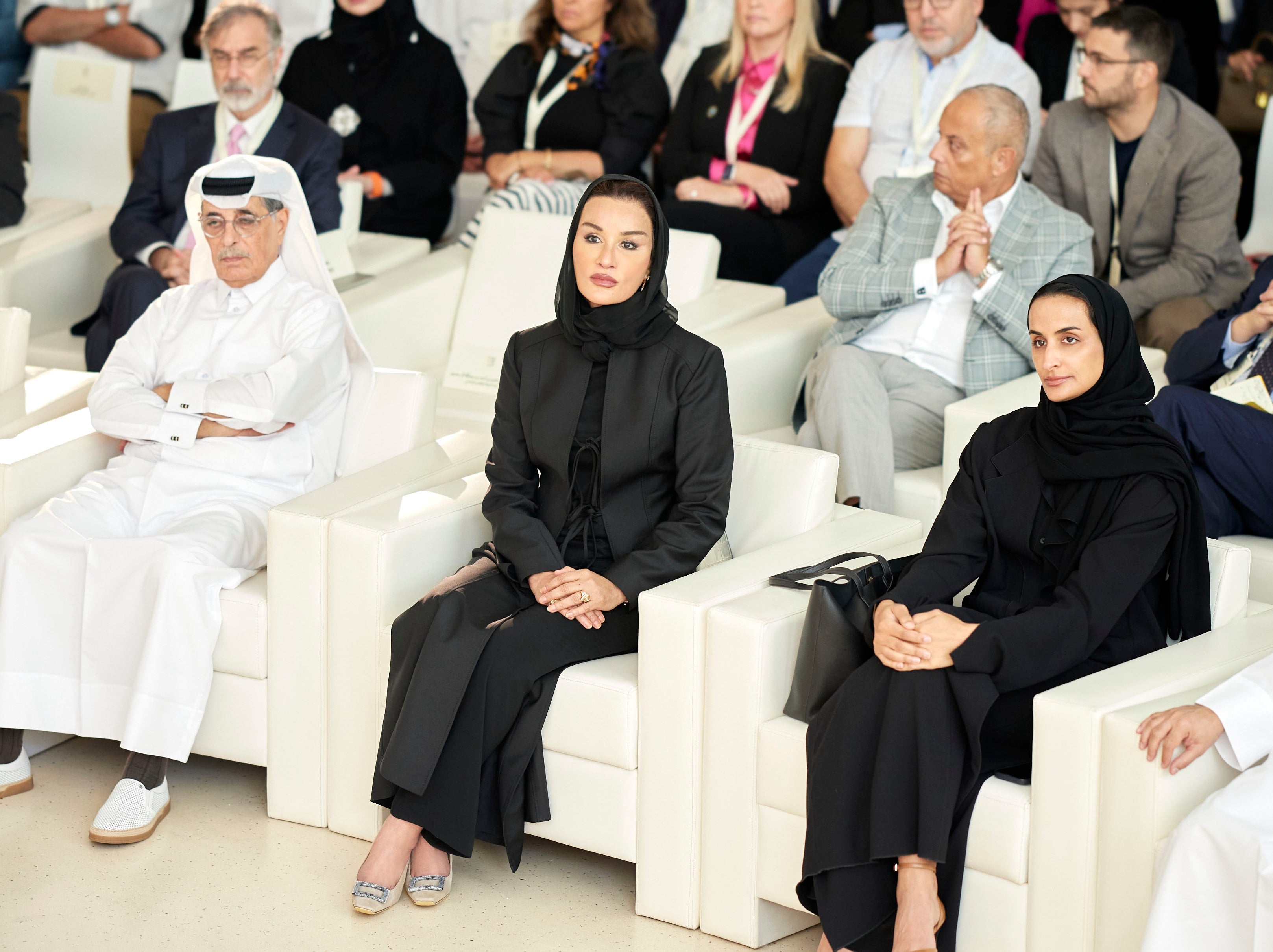Distinguished Arab experts from across the globe join milestone event spearheaded by Hamad Bin Khalifa University

Her Highness Sheikha Moza bint Nasser, Chairperson of Qatar Foundation (QF), attended the opening of the Arab Global Scholars (AGS) Annual Gathering.
Commenting on the gathering, Her Highness Sheikha Moza bint Nasser said: “Today we held the annual Arab Global Scholars gathering – a natural continuation of the Arab Expatriate Scientists Conference which we launched in 2006. I was delighted to meet this diverse community of scientists, innovators, researchers, research institutes, and industry partners, with whom we aim to strengthen our partnerships. Today, AGS members may be based anywhere in the world, as through technology we explore new and different methods of collaboration, making it easier for everyone to contribute to ensuring this region is stronger and better able to overcome the challenges of the 21st century.”
Held at Hamad Bin Khalifa University's (HBKU) Minaretein building, the occasion heralded the latest evolution of QF’s initiative to nurture a contemporary renaissance of Arab science and research by reconnecting scholars and intellectuals with roots in the Arab world back to their region to contribute to its positive development and long-term future.
Its beginnings going back almost two decades, AGS originally stems from the formation of QF’s Arab Expatriate Scientists (AES) Network. Today, AGS has solidified itself as an innovation-focused community linking Arab scholars, research institutes, universities, and industry partners to advance science, research and capacity-building projects from within Qatar. Current AGS member and partner organizations include more than 14 key institutions in Qatar and beyond.
The three-day event sees esteemed internationally and locally based Arab experts working to impact the sciences and humanities within the Middle East and beyond engaging in high-level dialogue and dedicated workshops designed by HBKU. Centered on areas of local, regional, and global importance, such as Precision Health and Biotech, Artificial Intelligence, Cybersecurity, Sustainability and Environmental Health, proceedings also provide opportunities for exchange between scholars and policymakers.
A central element introduced at the opening was AGS’ digital platform, which has advanced into an immersive and interactive space that introduces members to a wealth of collaborative opportunities. These include research projects, academic and student exchanges, and professional development activities. In establishing the platform, AGS recognizes that distance and geographical boundaries are no longer obstacles to the convergence of Arab expertise and creation of a knowledge center that inspires current and future generations to develop Arab-inspired solutions for regional and global challenges.
Following opening remarks, the first day commenced with a panel on the role Arab intellectuals must play in shaping contributions to the Arab renaissance. Featuring Dr. Dina Katabi, Director, Center for Wireless Networks and Mobile Computing, Massachusetts Institute of Technology; Chief Executive Officer, Emerald Innovations, Dr. Shihab Kuran, Co-Founder and Chief Executive Officer, Power Edison, Dr. Taha Kass-Hout, Global Chief Science and Technology Office, GE HealthCare, and Dr. Hilal Lashuel, Research, Development, and Innovation Advisor to the Chairperson & Executive Director of RDI, QF, the panel offered perspectives on the importance of Arab-inspired efforts for addressing the myriad educational, technological, social, and economic challenges facing the region. The session was moderated by Dr. Ahmed Elmagarmid, Executive Director, Qatar Computing Research Institute and Acting Vice President of Research, HBKU.
Speaking after the panel, Dr. Katabi said: “While the challenges facing the Arab world are considerable, they are by no means insurmountable. Each requires a distinctly Arab response that prioritizes a deep regional appreciation of the problem at hand, as well as academics, scientists, and industry working together to positively shape the Arab future. AGS is ideally placed to facilitate and support such initiatives, turning obstacles into opportunities in the process.”
The second day will end with a distinguished scholar address concerning recent developments in the fields of AI and Generative AI, delivered by Dr. Usama Fayyad, Inaugural Executive Director, Institute for Experiential AI; Professor of Computer Science, Northeastern University; Chairman, Open Insights.
The gathering will conclude with a panel discussion on the critical role Arab intellectuals can play in post-conflict recovery and reconstruction. Featuring key insights by Dr. Chaouki Abdallah, President, Lebanese American University, Dr. Karem Ahmad Sakallah, Professor of Electrical Engineering and Computer Science, University of Michigan, and Ms. Hend Alhinnawi, Executive Director, Humanitarian Tracker, the session will explore how Arab scholars can leverage their knowledge and networks to offer multidisciplinary support during times of conflict. The panelists will also consider contributions Arab intellectuals and professionals could potentially make to engaging with and rebuilding conflict-affected communities.
“Today was a highly-productive start to the gathering,” said Dr. Abdallah. “Discussions have been full and frank but nonetheless fostered a vibrant knowledge exchange among stakeholders who care passionately about the future of the Arab world. I look forward to engaging with my peers on matters of mutual interest and concern over the coming days.”
Over the course of the next two days attendees will also participate in a series of workshops, roundtable discussions, and visits to partner organizations.





